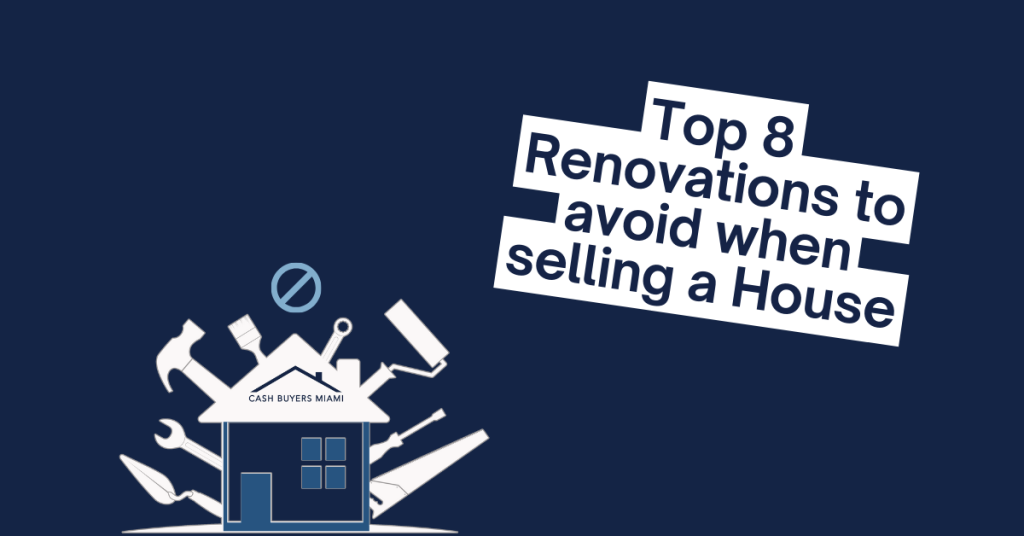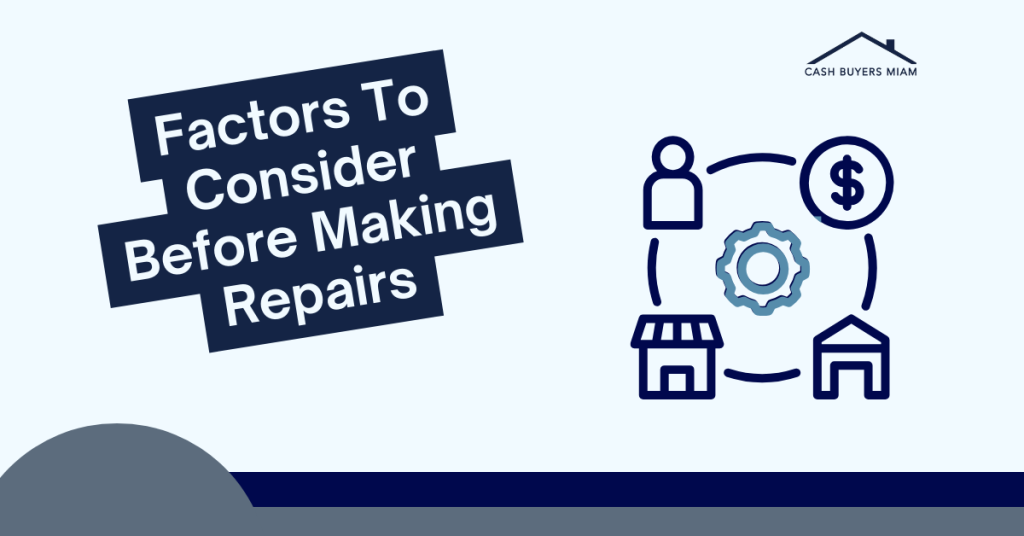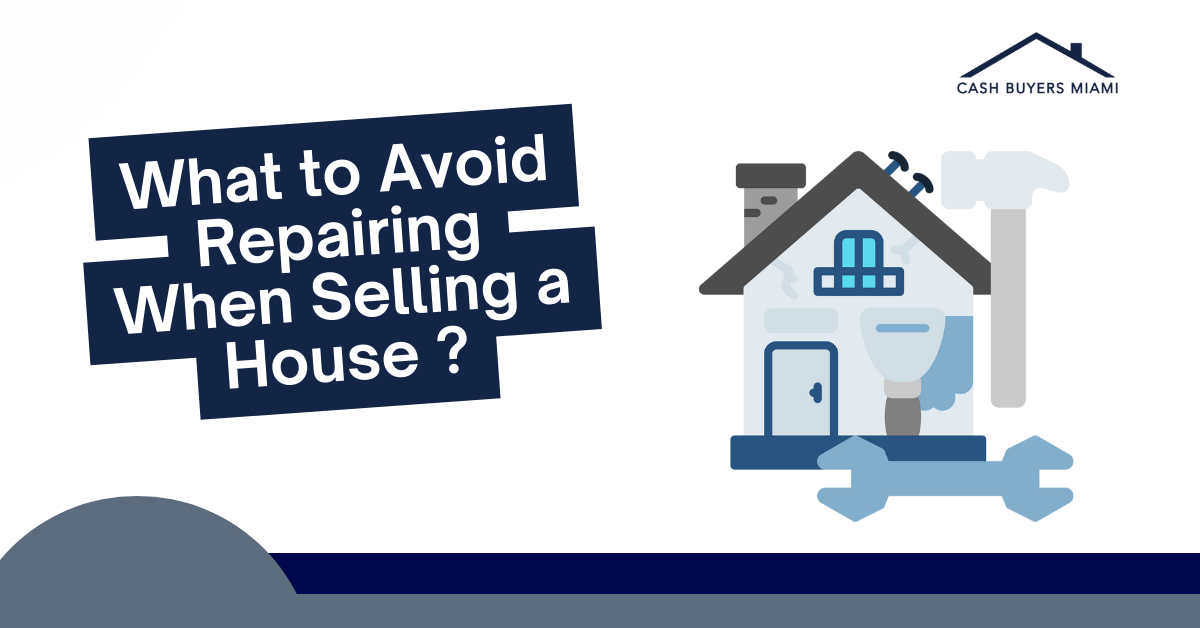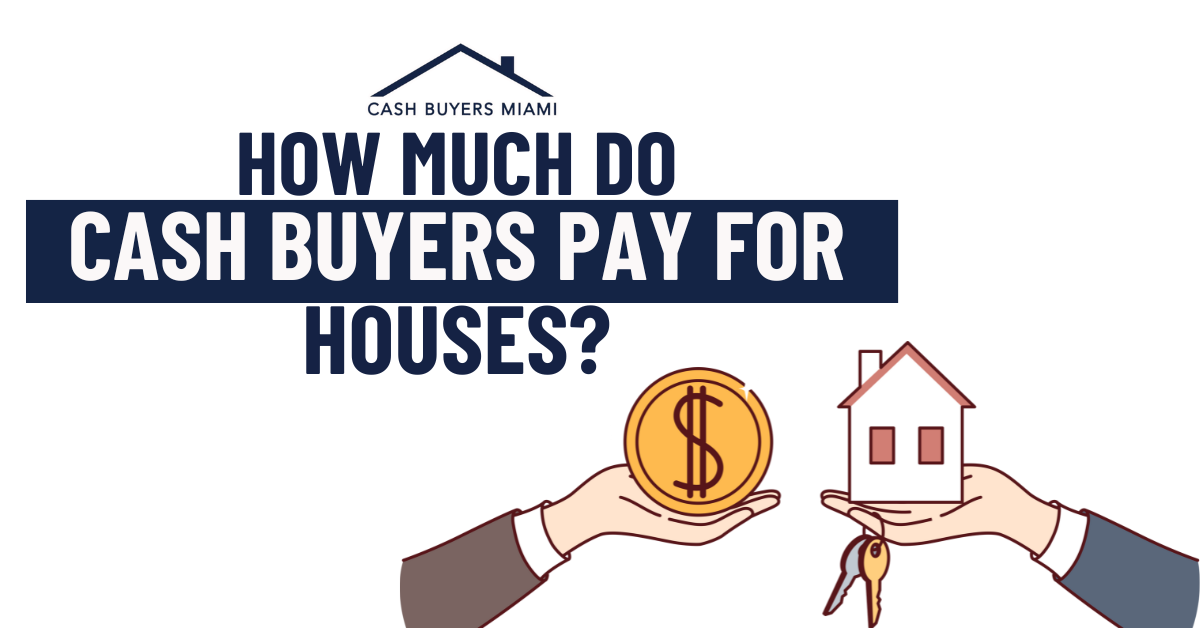What to Avoid Repairing When Selling a House
The perceived value of a product often relies upon its novelty and pristine condition, yet this principle does not uniformly extend to real estate, particularly houses.
When preparing to sell a home, the compulsion to address every imperfection may happen. Discerning between necessary repairs and discretionary enhancements can present a challenge.
Our assistance is here to help you with the process. By avoiding essential tasks from your list focused on enhancements or replacements, you will save time, resources, and energy.
Let’s find out what to avoid repairing when selling a house!
Deciding to Avoid Repairing: Steps to Follow
Step 1: Consult with a top local agent
Consulting with a top local agent is a wise step. It will help you to know where it is necessary to make repairs, upgrades and where you can save money by leaving projects undone.
Step 2: Determine if you will recoup your costs
Do you think renovations or improvements add value and offer a good ROI? Well, it relies on the market where the house is located.
Under the Cost vs. Value evaluation, replacing damaged or dated garage doors provides the second-highest return on investment. However, it is recommended that you avoid such expensive tasks before you put your house on the market.
Go for minor kitchen remodels or painting and landscaping, which offer more bang for your buck and are safer investments.
Also read: How much do cash buyers pay for houses?
Step 3: Identify and rule out vanity repairing
When selling a home, it often prompts owners to address lingering tasks on their old to-do list. Prior to diving into renovations, keep in mind that it’s wise to focus on selective fixes. Opt for suitable upgrades and steer clear of making your home appear overly staged.
Top 8 Renovations to avoid when selling a House

Here’s a list of renovations you must avoid while selling a home.
- Landscaping
- Minor Cosmetic issues
- Minor HVAC, electrical, or plumbing issues
- Carpet or flooring
- Outdated Parts Of A Room
- Partial upgrades to bathrooms or kitchens
- Old appliances
- Outdated Décor
Keep reading this article to better understand not-to-do lists when selling a home.
Also read: How to find cash buyers for your home?
Landscaping
Avoid overspending on huge landscaping projects. Many individuals invest significant amounts in tasks like weeding, mowing, planting grass, applying fresh mulch, and purchasing expensive plants to enhance their home’s curb appeal. However, we advise against splurging on large landscaping projects. Opt for cost-effective renovations that still enhance your property’s value.
Minor Cosmetics Issues
Quick, affordable fixes that enhance the appearance of your house for potential buyers, such as addressing cosmetic flaws, may not be high-priority tasks. These issues, like scratched floors, worn carpets, outdated fixtures, cracked blinds, cabinets, and countertops, along with bold paint choices, might not be the best investment, especially if the buyer plans to personalize the home later on.
Minor HVAC, Electrical, or Plumbing Issues
HVAC refers to the systems that regulate and move heated and cooled air throughout residential or commercial buildings. Proper HVAC is important to satisfy buyers while selling a home. However, it’s suggestable to avoid spending a lot of money to provide a lavish HVAC system or resolve plumbing issues.
If your home is outdated and has frayed wiring, poorly wired rooms, or faulty circuit breakers that lead to electric shocks and challenge safety, then ensuring the home’s electrical system is recommended.
However, not every minor electrical issue poses a hazard. If your electrical panel, water heater, or AC system is aging but still working efficiently, it’s best to refrain from unnecessary updates. Save your money by not upgrading a system that is already functioning well.
Certain electrical problems, like loose outlet plugs, inactive outlets, or a light switch that might not be connected to anything, could be overlooked.
Carpet or Flooring
Floor coverings such as carpeting, vinyl plank, laminate, and sheet vinyl gradually wear down and are meant to be occasionally replaced. However, carpeting should be cleaned professionally rather than replaced. Hardwood replacement can be costly, hence it is recommended to sand or refinish it only when there is significant damage.
Outdated Parts of the Room
Paint is a design element that completely changes a room’s look, making it more appealing for buyers. Speak to your realtor to figure out when to update the room’s paint. Don’t spend too much on wallpaper to update walls or patch up small holes.
Partial upgrades to bathrooms or kitchens
Upgrading only parts of the bathroom and kitchen can be very costly. Investing in expensive partial upgrades may not significantly increase the value and could end up being a financial setback. Opting for a full remodel to enhance the appearance of the bathrooms or kitchen is a better choice, or simply leaving them as they are. Allow the buyer to customize the space according to their preferences.
Old Appliances
Household appliances add a significant look to the rooms. But that doesn’t mean you must update or replace appliances with newer, shinier models before selling your home. You should prefer other necessary renovations rather than these extras.
Outdated Decor
Instead of fixating on cracks, take a broader view of your home’s exterior. Identify impactful renovations that can enhance your house’s appeal, rather than investing in minor details like walkway cracks, which may not significantly influence potential buyers. However, if the crack is linked to an underlying issue, it should have been noted in the inspection report.
When making renovations at home, spend money wisely instead of wasting it. Choose a strategic way to improve your curb appeal and exclude unnecessary items.
Factors To Consider Before Making Repairs

Consider the factors listed below before making repairs to your home.
- Cost vs. Return on Investment (ROI)
Upgrades aren’t advised before selling a house due to potentially low return on investment. The National Association of Realtors Remodeling Impact reported even small upgrades may not pay off. Therefore, it’s recommended that money be put into band-aid fixes.
- Market Conditions
Consider market conditions before taking steps toward the renovation process. You must consult your realtor, who can help you through comparative market analysis to set a sale price based on competition in your living area.
- Urgency of the Sale
Determine the precise duration for your projects to plan effectively. Aim to finish renovations before potential buyers come to view the property. Incomplete remodeling may deter buyers when they see only a partially finished project.
Why You Should Not Repair These Items
Concentrating on fixed items that could enhance your home’s selling price is beneficial, but overspending on repairs or replacements could end up being ineffective. Potential buyers may not perceive the upgrades as essential or even recognize that any work has been completed. Buyers don’t crawl under the house to find minor cracks in the foundation or old water stains on the roof. They usually see a big or whole picture of your home. So, try to be efficient when making repairs to save money, time, and effort.
What You Should Repair When Selling Your House
Following is the list of things you must fix before selling your home.
- Address basic wear and tear in the areas.
- Concentrate on affordable cosmetic enhancements that require minimal time and effort.
- Renovate foundation or roofing, if necessary.
- If painting is necessary, then go for neutral paint such as an off-white or gray color to give your home a classy look.
- Enhance the visual appeal of your property by planting beautiful but cheap flowers.
Other Things to Consider During Home Selling
Setting Realistic Expectations
Seek guidance from a real estate agent knowledgeable about similar properties in the area for valuable insights. This will help you evaluate the property’s worth and budget for any needed repairs. A home inspector can make your renovation process by highlighting critical structural repairs that need addressing.
Home Inspections
Just a reminder: the buyer will hire the services of a home inspector once the deal is sealed. Even if you’ve already arranged for an inspection, the buyer will bring in their own inspector. After the inspection, the buyer can leverage the report to request repairs from the seller or negotiate for a deduction from the sale price.
Negotiations With Potential Buyers
When interacting with potential buyers, sellers can provide concessions such as a home warranty or assistance with closing costs instead of handling repairs personally or hiring a professional
Conclusion
When selling a home, not all updated features and gadgets are wise investments. It’s important to carefully decide on renovation priorities. Keep in mind that not all repairs or upgrades add significant value to a home; some can be overlooked. It’s advisable to consult with a reputable local agent to assess the property’s value before finalizing a deal with the buyer.
Avoid unnecessary expenses on landscaping, minor cosmetic fixes, HVAC and electrical issues, carpeting or flooring, outdated room elements, old appliances, and outdoor decorations. Consider factors like ROI, market conditions, and the urgency of the sale to make informed decisions. Setting realistic expectations, allowing home inspections, and negotiating with buyers are strategic steps to expedite the home-selling process.








